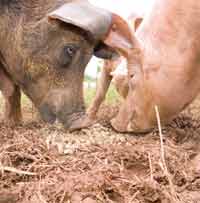Training scheme improves career path in pig management

With the pig industry struggling to attract young people into the sector, one pig producer, alongside BPEX, has come up with a training programme which could be used as a national template.
Terry Ledbury, production manager for Fawley Farms, which manages 7000 sows at a number of pig units in the south, approached BPEX with the view to develop potential managers.
“In the past we were using the odd training course for our workers, but there was no clear career path for the younger employees.”
The move towards a more structured programme was triggered by pig manager, Rupert Brewer’s move from Preston Farm, breeding unit, Tarrant Keyneston, Dorset, to another unit in the Fawley Farms business.
“Rupert’s move has meant his number two, Jason Gibson, will have to step into his shoes. We wanted to make the transition as smooth as possible. Our under manager at Down Farm has also been involved in the programme.”
Following discussions with BPEX knowledge transfer manager, Helen Thoday, they have developed a management training scheme.
“The key is to expose our workers to the wider picture of pig production,” says Mr Ledbury.
With this programme we hope to attract candidates that can see a structured career pathway within the company that is actively worked on, says Andrew Stockings, Fawley Farms owner.
The course is spread over 12 months, covering all areas influencing pig production at the unit.
We approached it from a whole chain perspective, says Ms Thoday. “BOCM and PIC are strongly involved.
“There will be a feed mill visit and nutrition training to give an idea of feed production and management. PIC has also been involved in talking about the practicalities and background to AI.”
Working together can only be viewed as positive for the industry, says Richard Shearwin, BOCM account manager. “Understanding the hassles faced by farmers and feed mills alike will help us work better together and ultimately create a more profitable industry,” he says.
Trainees also gain computer skills and visit nursery and finishing sites, ending with a trip to an abattoir.
Larkmead vet practice has been involved in designing practical pig health days on farm and ensuring a good knowledge base for herd health, assurance and legislation. This has been useful at highlighting potential areas for improvement, says Mr Gibson.
“The vet brings with her our recent records and we walk around the pigs to identify an action plan for improvements.”
As a result, the farm has made some changes to the boar pen to increase efficiency.
Fawley Farms, employs 30-40 people, making setting up such a scheme extremely worthwhile, says Mr Ledbury.
“Until now, those at the breeding unit only saw the pigs up to weaning age and no further.”
“Because we are a multi-unit system, we can swap between units to give people working on different section an idea of the whole production chain.”
This has increased communication between sections, says Mr Gibson. “It is easy to get stuck on your own farm. By swapping between units we can open our eyes to all aspects of the chain.”
The main attraction to us was the flexibility of the course, says Mr Ledbury. “The beauty of the course is it has been built specifically for our needs and the type of people we employ.”
But, the programme has the potential to be developed into a national scheme, says Mr Ledbury.
“The system could be used to encourage new people into the industry by offering a clear progression and development plan.”
An exciting development is further interest from existing managers at Fawley Farms. “Established managers have asked to get involved. We will be having a number of meetings to discuss how we can tailor the course to meet their needs and push them to a higher management level.”
“We believe this may involve developing research projects for individuals to take on and learn how things can be changed for the better at a practical level.”
These units could be packaged as units of excellence, say Ms Thoday.
And there is definitely no reason why this scheme cannot be rolled out on a national level, when farmers show an interest, she says.
“A multi-unit business can really benefit by swapping staff between stages, however, there is also the potential for smaller farmers to set up groups and swap between sites to gain incite into different levels of production.”

